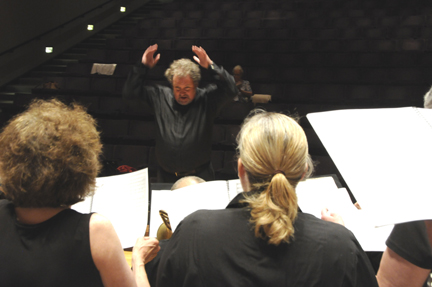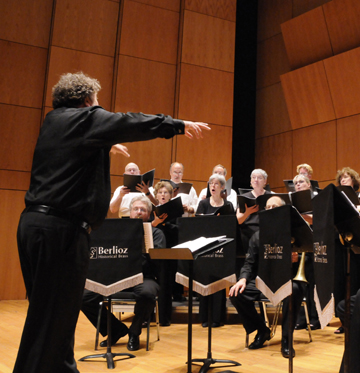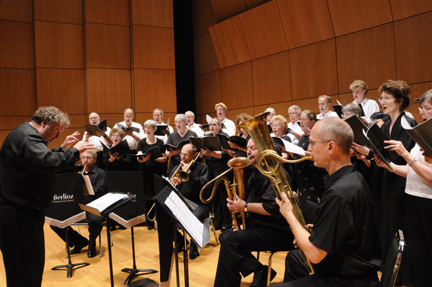
premiered at the
2009 Early Brass Festival
Amherst Early Music Festival
Sunday, 2:00 p.m.; July 19th, 2009
Evans Concert Hall, Cummings Arts Center
Connecticut College
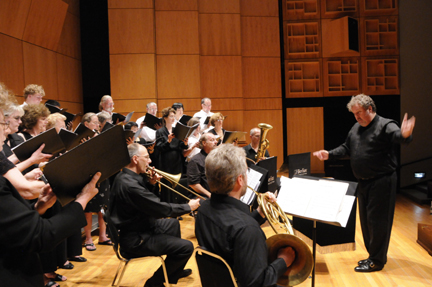
Mendelssohn's Seasons by Clifford Bevan
World premiere
with words by Henry Wadsworth Longfellow
An April Day
Rain in Summer
Autumn
King Witlaf's Drinking-Horn
Jeffrey Snedeker, horn; David Loucky, trombone;
Craig Kridel, English bass horn; Douglas Yeo, ophicleide
The Anglican Singers of New London,
Wim Becu, guest conductor
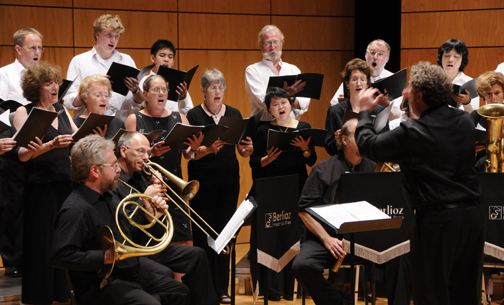
Mendelssohn's Seasons
comments from he composer, Clifford Bevan
“The most ineffective and most offensive way to offer a tribute to that extraordinary nineteenth-century German polymath Felix Mendelssohn-Bartholdy (1809-1847) would be to try to compose in his own very distinctive style. Thus, rather than attempting a work of musical pastiche, I have tried to allow myself to be influenced by his music in the way that several generations of British musicians were influenced, as recently as the early twentieth century.
Although Mendelssohn was a fluent English speaker and set many verses to music, these did not include any of these written by his contemporary, the American poet Henry Wadsworth Longfellow (1807-1882), though there is little doubt that each was aware of the existence of the other.
Mendelssohn paid many visits to Britain where he established a unique popularity with a large cross-section of the population. Prince Albert, Queen Victoria 's German consort, greatly approved of his compatriot's wholesome attitude to music and the arts (Mendelssohn was also a gifted painter), resulting in regular music-making in the royal presence. At the same time, Mendelssohn forged strong links with the Philharmonic Society in London , and his oratorio Elijah was commissioned by, and first performed at, the Birmingham Music Festival of 1846. His slighter pieces, particularly those for pianoforte, were sold in vast numbers for the delectation of the emerging middle classes.
Mendelssohn did not take up an invitation to visit the United States , but his popularity there was second only to that in the United Kingdom. Elijah, for example, was first performed in the Broadway Tabernacle, New York on 8 November 1847 by the New York Sacred Music Society. The second performance was given on 9 November 1847 by the American Musical Institute in the same hall.
Longfellow's interest in Europe became evident with his student enthusiasm for the works of Sir Walter Scott. A remarkable linguist, his first journey across the Atlantic resulted from Bowdoin College 's appointing him Professor of Modern Languages on graduation on the condition that he spend time in Europe. Later, he was appointed to a similar post at Harvard and made further visits to Europe, particularly England and Germany .
As a writer who treated Romantic subjects in an approachable style he achieved wide popularity throughout the English-speaking world. In this respect composer and author shared something in common. They also shared the inevitable reaction of later generations. Longfellow's fate was to be designated as a “hearthside rhymer,” while as early as 1881 the journal Punch was reflecting progressives tastes of the time by referring disparagingly to Mendelssohn's music with its lack of “wrong notes.”
The present work is an attempt to suggest what might have been. The instruments used were all included by Mendelssohn in various of his compositions for choir and orchestra, and throughout the work certain of his themes appear. These are particularly evident in the introductions to the first and fourth movements and the second half of the first movement. He benefited (or suffered) from strict musical training in his teens which, along with his great love for the music of Johann Sebastian Bach, attracted him to fugal forms. The third movement of Mendelssohn's Seasons acknowledges this.
Particularly in his orchestral works there is sometimes a vigour which can be easily overlooked, and the fourth movement reflects this aspect of his style. Throughout, there are also reminders of the debt that Mendelssohn, like other nineteenth-century German composers, owed to the folk music of his country.
The overriding practical aim has been to approach as far as possible Mendelssohn's unrivalled success in giving choirs the opportunity for a ‘good sing'.”
Clifford Bevan graduated from the Royal Academy of Music, studying low brass and composition, and served as principal tuba of the Royal Liverpool Philharmonic Orchestra and, later, as a London West End Theatre musician. Dr. Bevan's 1978 publication, The Tuba Family , with an expanded second edition released in 2000, became the definitive historical account of the tuba, euphonium, and related low brass instruments and led to the International Tuba and Euphonium Association establishing the Clifford Bevan Award for Excellence in Research. Bevan was a member of the London Serpent Trio during the time of Christopher Monk and has subsequently assumed the role as spokesperson. In addition, he was the arranger, trombonist, and pianist in The Temperance Seven, a popular British music group of the 1950s and early 1960s managed by “the fifth Beatle,” Sir George Martin.
Earlier this month Clifford Bevan received the Historic Brass Society's Christopher Monk Award, presented at the Galpin Society Meeting at the Horniman Museum . Mendelssohn's Seasons is the second Bevan work commissioned by Berlioz Historical Brass. Les Mots de Berlioz was performed in 2003 and is included in the BHB-assisted recording, Le Monde du Serpent by Douglas Yeo.

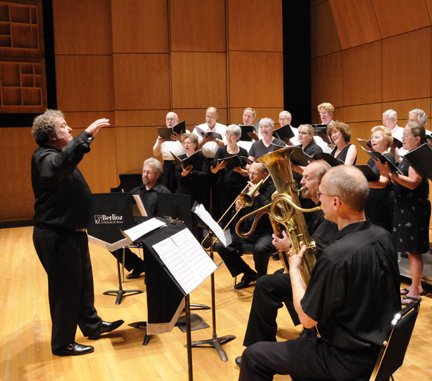
Piccolo Press : ITEA Historical Instrument Section : The Tigers Shout Band : Harmoniemusik : Links
